After spending over 20 years in the marketing trenches, which followed 15 years in Finance and Strategy, I've seen firsthand how the industry has evolved—and how companies continue to struggle with the same fundamental challenge: efficiently connecting marketing activities across the entire customer journey.
This challenge is precisely why we founded Woodside Ventures with a fundamentally different approach to marketing. We've built our focus specifically to address the inefficiencies that plague the traditional multi-agency model, delivering truly integrated campaigns that seamlessly connect every touchpoint in the customer journey from broad awareness plays all the way through conversion.
My “unique”, as it has been called by a number of friends, career path has given me a unique perspective on this issue. From my early days managing financial metrics, budgets and P&L models to CMO roles overseeing integrated marketing strategies for global brands such as Dick’s and GNC to the last 8 years of CEO roles where it all comes together, I've experienced the pain points from multiple angles. What stands out most clearly from this experience is a simple truth: siloed marketing approaches create inefficiencies that weaken results and put money in agency’s pockets rather than yours.
I want to share why I've become such a strong advocate for the integrated agency approach—having one strategic partner manage your entire marketing funnel from awareness through conversion—why this model consistently outperforms the fragmented alternative and why we’ve structured Woodside Ventures to be that all in one solution.
The Problem with Marketing Silos
Many companies still structure their marketing in a way that made sense decades ago but creates significant challenges today:
- Brand strategy agencies handling awareness campaigns
- Media agencies managing consideration and interest
- Performance marketing agencies focusing exclusively on conversions
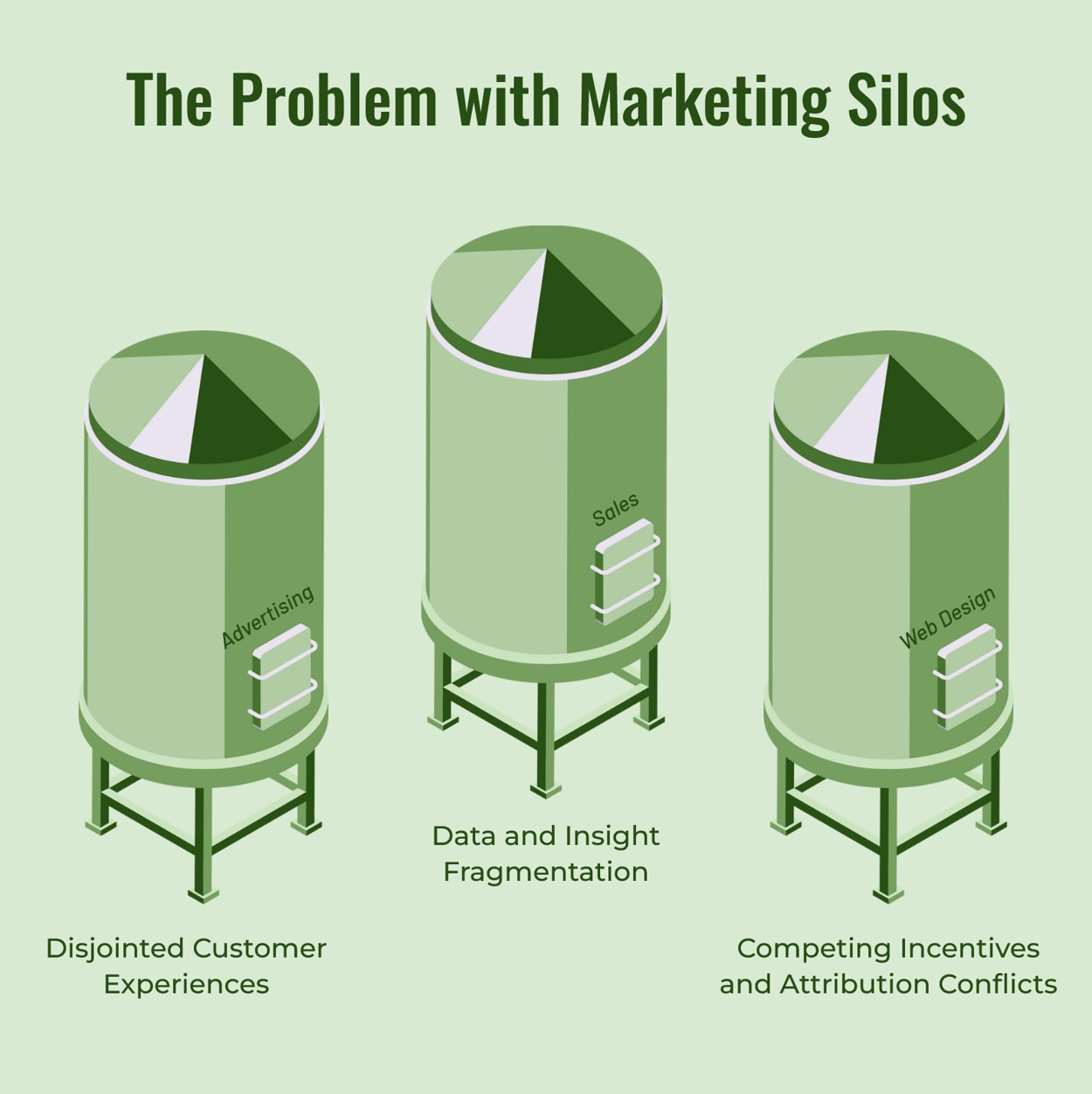
This fragmentation creates several critical problems:
1. Disjointed Customer Experiences
When different agencies handle different parts of your funnel, customers experience jarring disconnects as they move through their buying journey. The messaging, visuals, and overall experience lack cohesion, undermining trust and reducing conversion potential.
I witnessed this firsthand when working with a retail client who had three different agencies: one for social media content, another for display advertising, and a third for search and conversion optimization. Customers would encounter completely different messaging, offers, and even visual identities depending on where they were in their journey. The result? Confusion, higher costs, and ultimately, lost sales.
2. Data and Insight Fragmentation
Perhaps the most costly aspect of the siloed approach is how it fragments your data and insights. Each agency collects valuable information about audience behavior, creative performance, and conversion triggers—but this knowledge remains trapped in separate silos.
When your top-funnel agency discovers an insight about audience preferences, how long does it take for that information to reach your performance team? In my experience, these insights often get lost in translation or arrive too late to impact campaigns effectively.
3. Competing Incentives and Attribution Conflicts
The most challenging part is that, with separate agencies serving different parts of the funnel, you inevitably create competing incentives. Your awareness agency wants credit (and budget) for building brand recognition, while your performance agency wants full credit for driving conversions.
This leads to endless attribution debates and can create a counterproductive competitive dynamic between your marketing partners—the exact opposite of what you need for success. As every marketer knows, if you add up all the attributed sales from each of your individual agency partners, you end up with usually 2-3x your actual sales…not something that is helpful at all.
The Integrated Agency Advantage
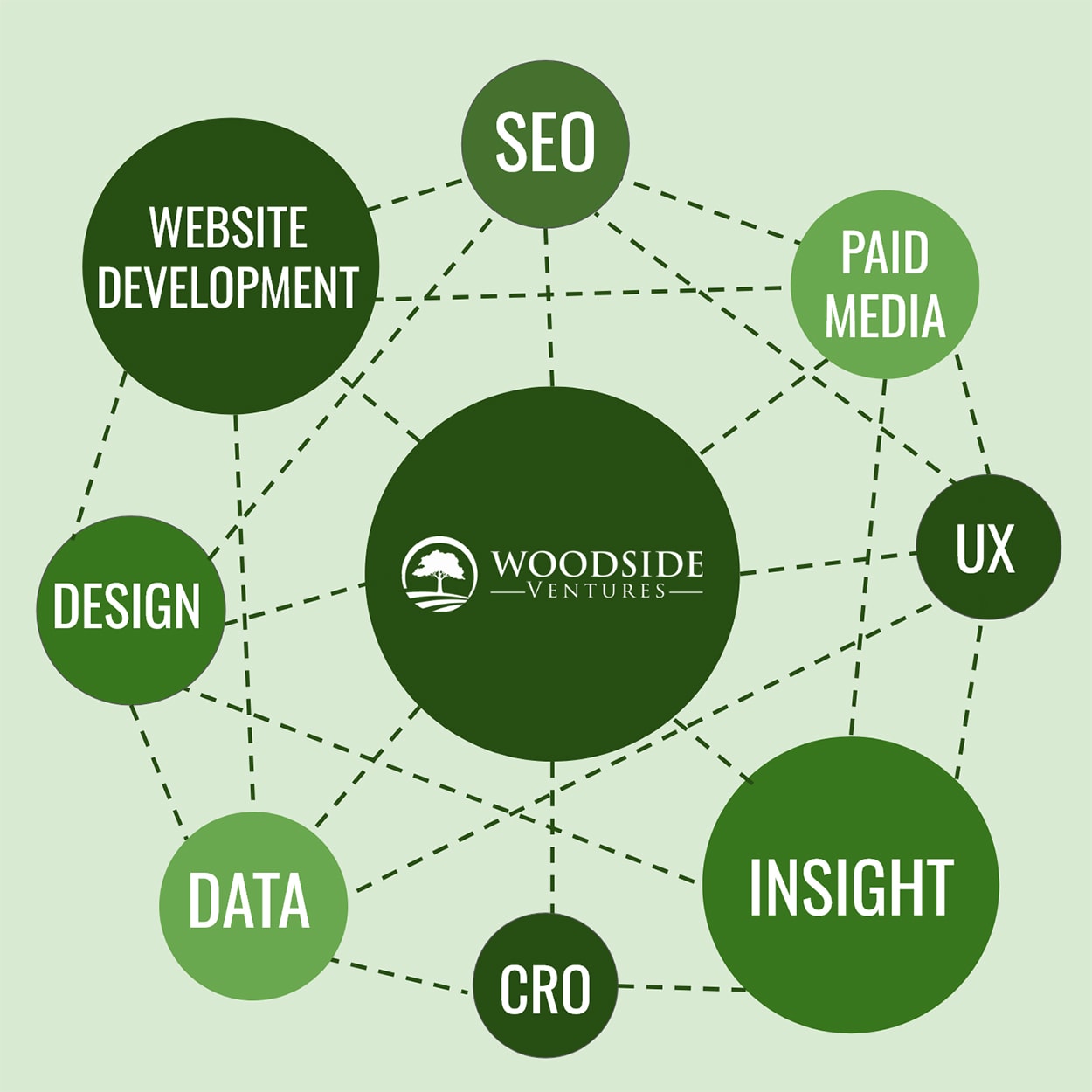
After experiencing these frustrations repeatedly, we became convinced that the integrated agency model—where one strategic partner handles your entire funnel—offers significant advantages:
1. Aligned Strategy and Seamless Execution
When one agency oversees your entire marketing funnel, your strategy becomes truly cohesive. The team developing your awareness campaigns understands exactly how those initiatives connect to your conversion goals. The creative concepts, messaging hierarchy, and audience targeting work in harmony rather than competition.
In practice, I’ve seen this work both with clients at Woodside and also in practice at companies where I’ve been CEO or a Board Member including Knockaround, Dr. Emil Nutrition and Goal Five, all growth DTC brands that are utilizing this approach today. The unified strategy has eliminated redundant efforts and created a seamless experience for our marketing teams.
2. Holistic Data and Faster Optimization
Perhaps the most powerful advantage of the integrated model is how it transforms your data utilization. Instead of insights being trapped in agency silos, information flows freely across funnel stages.
When your integrated agency learns something valuable from a top-funnel campaign—such as which creative concepts resonate most with specific audience segments—that insight immediately informs mid and bottom-funnel optimizations. This accelerates your learning cycle and creates a compound effect on performance.
In practice, this looks like discovering a particular messaging approach works well in awareness campaigns, then immediately adapting your conversion-focused assets to leverage the same psychological triggers—no delays, no crossed wires, just seamless optimization.
3. True Accountability for Business Outcomes
With one agency managing your entire funnel, you eliminate finger-pointing and establish clear accountability for results. Your agency partner can't blame poor performance on another vendor's work—they own the entire customer journey and are incentivized to optimize it holistically. (Does this sound familiar?)
This creates a fundamentally different relationship. Rather than focusing on narrow metrics for individual funnel stages, your agency partner becomes invested in your actual business outcomes—revenue growth, customer acquisition costs, and lifetime value.
Real Results from Woodside Ventures' Integrated Approach
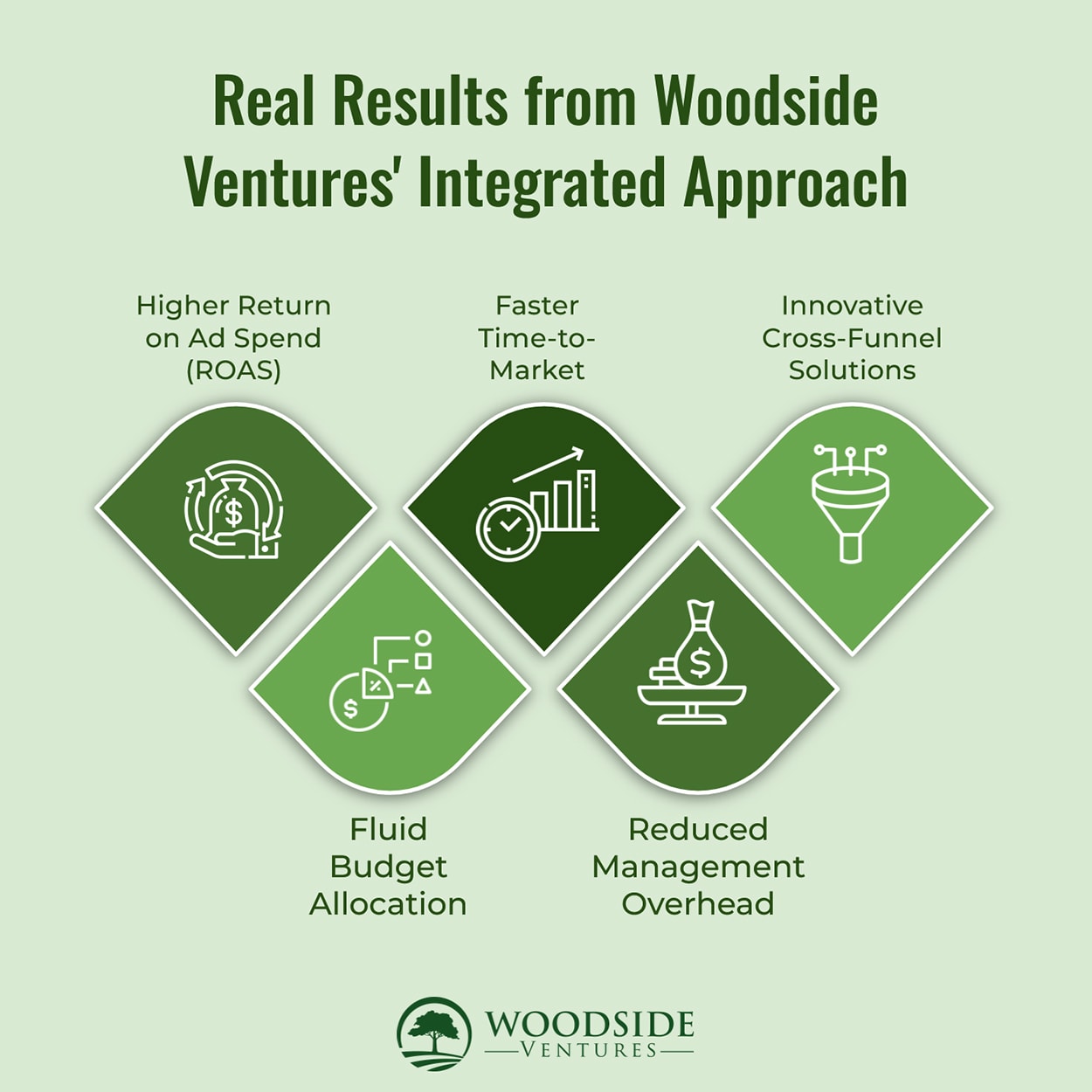
At Woodside Ventures, we've built our entire business model around this integrated philosophy, and the results speak for themselves:
- Higher Return on Ad Spend (ROAS): Our clients consistently see ROAS increases of 30-45% within the first year of working with us. Because we manage the entire funnel, we make intelligent, real-time trade-offs between awareness and conversion spending, optimizing for overall return rather than siloed metrics.
- Fluid Budget Allocation: One of Woodside Ventures' key strengths is our ability to seamlessly shift marketing spend between funnel stages based on real-time performance data. When we notice a particular top-funnel creative driving exceptional engagement, we can immediately allocate additional budget there, while simultaneously adjusting mid-funnel tactics to capitalize on the increased awareness. This dynamic approach is simply impossible with fragmented agency partnerships.
- Faster Time-to-Market: Our integrated teams move with exceptional speed. For a recent client, we conceived, produced, and launched a comprehensive multi-channel campaign in just three weeks—a process that had previously taken them over three months when coordinating between multiple specialized agencies.
- Reduced Management Overhead: Our clients that use Woodside as their integrated agency report saving countless hours per week that their marketing teams previously spent coordinating between agencies, resolving conflicts, and reconciling different reporting frameworks. This time is redirected to strategic initiatives that actually grow their business.
- More Innovative Cross-Funnel Solutions: At Woodside Ventures, our cross-functional teams develop creative solutions that siloed agencies simply can't discover. For one DTC client, we identified creative assets that really resonated with broad audiences and immediately converted those into performance ads across Meta to accelerate the journey to conversion.
The Woodside Ventures Difference: Our Integrated Methodology
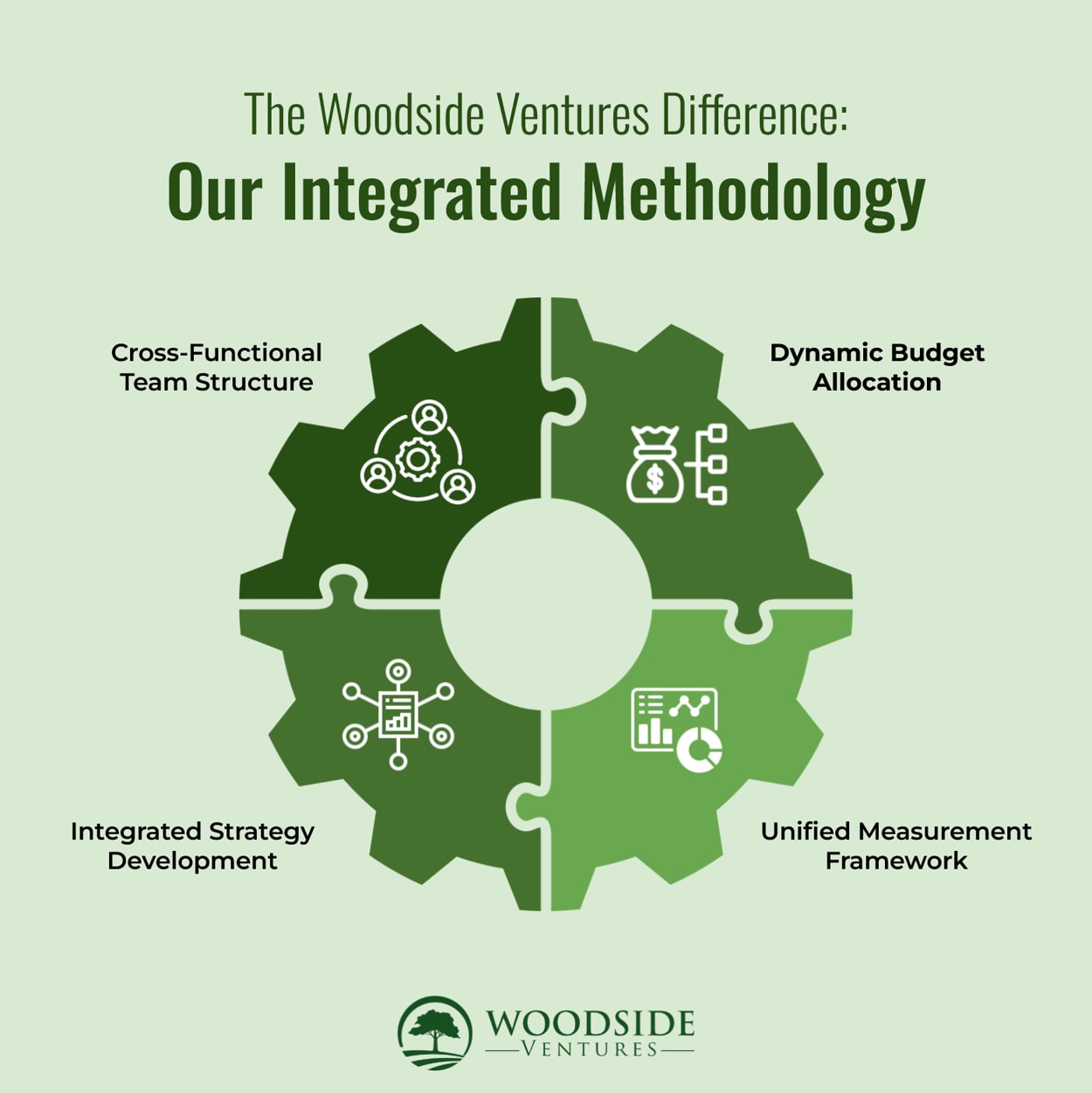
At Woodside Ventures, we've developed a proprietary approach to integrated marketing that addresses the challenges of the traditional agency model:
- Cross-Functional Team Structure: Unlike agencies that simply house different specialists under one roof, we organize our teams to ensure constant collaboration across disciplines. Our performance marketers sit alongside brand strategists and media strategists, ensuring that insights flow freely across the entire customer journey with consistency.
- Unified Measurement Framework: We've invested heavily in developing measurement approaches that accurately capture the relationship between awareness, consideration, and conversion activities. This gives our clients a true understanding of how their marketing investments work together, rather than viewing each channel in isolation.
- Dynamic Budget Allocation: Perhaps most importantly, our model allows for seamless movement of marketing spend between funnel stages. When we identify opportunities at the top of the funnel, we can quickly reallocate resources to capitalize on them, then adjust mid and bottom-funnel tactics to capture the increased interest.
- Integrated Strategy Development: Every client engagement begins with a comprehensive strategy that considers the entire funnel from the outset. This ensures that brand-building activities are designed to support conversion goals, and performance campaigns reinforce consistent brand messaging.
The Future Is Integrated, and Woodside Ventures Is Leading the Way
The marketing landscape continues to evolve rapidly, with new channels emerging and consumer behaviors shifting. This makes the integrated approach even more valuable, as it provides the adaptability and holistic perspective needed to navigate this complexity.
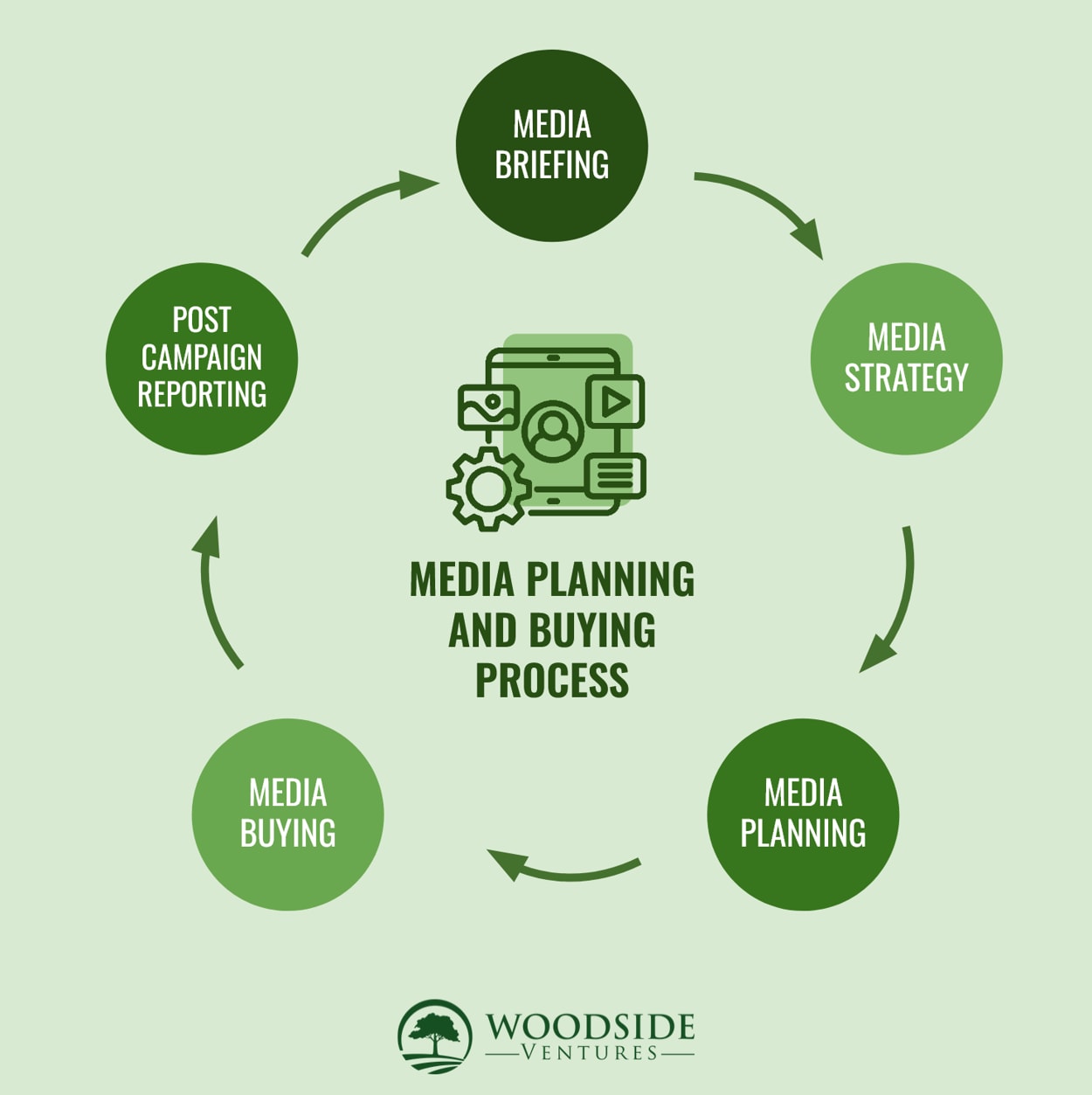
At Woodside Ventures, we're at the forefront of this shift. We've built our entire agency model around the belief that true marketing effectiveness comes from seamless integration across the funnel and that the traditional agency relationships with younger account managers and layers of bureaucracy is fundamentally broken. Our clients benefit not just from consolidated services, but from a fundamentally different approach to marketing strategy and execution.
If you're still wrestling with the challenges of a fragmented marketing approach—disjointed customer experiences, trapped data and insights, competing agency incentives—I encourage you to consider the alternative model that we have been championing now for the last 6 years across clients that range in all sizes and industries. The improvements in efficiency, effectiveness, and overall business impact make it well worth the transition.
And, if you’re thinking that your business isn’t large enough for an integrated model, it’s actually the opposite. Some of our team’s strongest case studies involve brands in the $5-50 million annual sales range.
Your customers will experience a more cohesive journey, your marketing team will gain valuable time back from agency management, and your marketing investments will deliver substantially better returns through our dynamic, integrated approach.
About the Author: Prior to co-founding Woodside Ventures in 2019 with Joey Rahimi, Mr. Hennion’s career spanned 30 years of growth business across numerous disciplines. His prior positions including a wildly diverse range including EVP, CMO and Chief e-Commerce Officer at Dick’s Sporting Goods and GNC; President & CFO of Branding Brand; Assistant Treasurer - Global Banking & Trading for Alcoa; and CEO at JEGS Automotive.
Today, in addition to his role as co-Founder & Managing Partner at Woodside Ventures, Mr. Hennion is also Chairman & CEO of Brand Holdings as well as CEO of two of its portfolio companies, Knockaround and Dr. Emil Nutrition. He also currently serves on the Boards of Athena Sport Ventures, Listrak, Brand Holdings and Knockaround.



